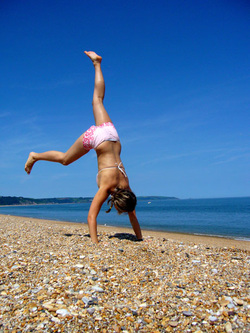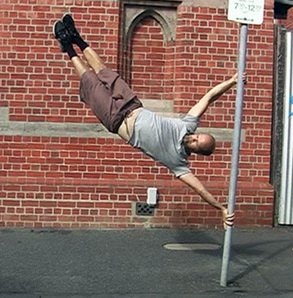 I really like having athletic goals. I hate it how people say ‘results-based training’ when they mean changing the way you look, because what I - in my elitist approach - like to call ‘results-based training’ equates to improved athletic performance. Those are the meaningful results. If you move the focus of your training away from yourself, outside of yourself and onto a task, you depersonalise notions of success and failure, and it frees you to play and experiment with your training. When your goal is based on something athletic, your goal isn’t you. You depersonalise it, which in this case is a good thing, because you make your training task-focused, and when you fail at a task, you just fail at a task, you don't fail at being you. You can experiment and play more, because there’s less riding on your results – if you progress, that’s great – but if you don’t, you can maintain a better perspective because it doesn’t reflect badly on you as an individual. In my experience, this enables you to begin regarding yourself and your training with less negative self-judgement, and a more confident view. You realise that your identity doesn’t hinge on your training or your body image, you treat your training as the acquisition of skills, rather than a personal flagellation, and you start to achieve real and tangible things, but those things don’t determine you. The downside to ambition is the pervasive desire for things to somehow be better, the intense dissatisfaction with the here and now and the feeling that you’re always swimming against the tide. It’s not a way I want to live, but it’s a cycle I’ve been snared in before. We need to realise that failing or succeeding at a task is not failing or succeeding as a person. What leads to increased confidence is not changing the way you look, it’s understanding yourself and your capacities, understanding that when push comes to shove, you can actually exceed yourself, and that it's only your perspective that limits you. Training teaches us that. Even when progress seems stubborn and slow to come, we learn how to push through our physical barriers, how and when to respect our limits and how to strive and progress, and since the mind and body are one - we are one being and not two - that knowledge and physical experience cannot help but influence other areas of our life. Your confidence in yourself develops as your physical abilities develop. When your confidence is based on something superficial, it's only that - superficial. Confidence comes from strength, not appearance; people who look ‘normal’ are not necessarily more confident than those of us who appear to be ‘different’. Want confidence? Train your strength. Get strong. When you know in your guts that you are capable of growth, progression and excellence, that's something you know in your guts. My ultimate goal is to be healthy and vital into old age. To achieve that I realise I need to set other, smaller goals along the way to keep me on track, but it does not necessarily matter whether or not I achieve them. What matters is that I keep exercising – not according to any system, program or prescription – I just need to practice things I enjoy that keep me fit. I know that burning out on athletic pursuits which are too intense, and not training again after the age of 35, is not in keeping with my ultimate goal. Subsequently, my ‘eating goal’ is to establish and maintain a good relationship with food which is based on self-awareness and remains free from judgement and guilt, because I believe that will serve me for life far better than any nutritional system or dietary plan ever will. It means listening to my intuition, and acknowledging that my body knows what’s good for it better than my intellect does. If you haven't been able to discover the satisfaction of training, if you haven't experienced that which is intrinsically rewarding about exercise, if you haven't developed an appreciation of exercise for its own sake - how are you going to be able to keep active and vibrant as you age? So one potential goal is to become less goal-focused. To be able to enjoy training for its own sake, irrespective of whether or not you're working towards anything. A couple of months ago, someone at the gym said – when asked what he was working towards – “goal setting? Can’t we just train?” Yes. Yes we can. To play and be and pursue your own enjoyment of activity, free from the demands of propaganda – maybe that's what it means to be youthful? Lately I’ve made some realisations about ‘conventional cardio’. I resented ‘cardio’ because I thought of it as ‘that thing we do in order to lose weight’. I didn’t see the point. But I love strength training – I find it intensely rewarding and enjoyable, but I know other people think of lifting weights in the same way I used to think of ‘cardio’. Perspective and satisfaction are interesting concepts. Now I realise through freedom from propaganda that the term ‘cardio’ is meaningless. To train is meaningful – to me – and that topic will become a post in the near future. But is it really a goal, to simply enjoy training? Is it objectively measurable? Not really. Can you apply a time-line? I doubt it. Does that mean it's ‘not a goal’? I don't give a toss. Can you tell when you’re there? Absolutely. People get really dogmatic about what qualifies as being an actual, realistic goal. To develop your core strength isn't a goal, but to lift 200 pounds is? I really don't care. Pursue what you want. What gets you going? And out of that grand sphere, what can you use that does not rely on the exploitation of your fears and insecurities? What of all those options will actually serve your best interests, as opposed to fill other people's pockets with money? What will help you to grow and develop? And what is only keeping you obedient and afraid? It’s also my ultimate goal that led me to greater introspection, to analyse my motivation. I’m aware that training for vanity’s sake will only let me down in the long term. Either one day I’m going to get over myself or I'll grow into an old man who is still far too concerned about what other people think. And I don't like that idea at all. Anyway, I currently find lifting heavy things and doing tricks enjoyable - for whatever reason I find it rewarding, even cathartic - so most of my goals are based on heavier lifts or more chin-ups or improving my handstands, or something like that.  I wanted to go to Circus School once. That's right, in Melbourne there's a three-year full time bachelor degree you can do in circus. To the left, you'll see one of my recent ‘human flag’ attempts. This photo shows my body at an upwards angle, hanging off a sign that said ‘angle parking’, I think – when horizontal I can hold it for almost one second. As much as I had cool ideas and tricks I wanted to nail, there was this voice in the back of my head saying “you'll have abs, Chris, you couldn't possibly do all that training and not get six-pack abs. Do it for those sweet, elusive abs”. Maybe you get that too, this self-judgement or expectation voicing ideas in the back of your head? Something like “when I can do ten chin-ups, surely I'll be thin. If you can do chin-ups it means you're fit, and fit people are thin”? If you're focusing on a goal because you believe that being able to achieve that goal equates to something else, it’s based on self-delusion. That shit ain’t honest. I’m not going to say it won’t work - maybe it will? What do I know? But what does it mean to commit to that process? To invest in delusion? I don’t know, but I’m not interested in lying to myself any more. I feel like I see this in people all the time. “I’d like to run a marathon...” because that means I'm fit, and fit = thin. Nah. Running a marathon is awesome for two thousand other reasons. And it’s also dangerous. Don’t do it unless you want to do it. “I started running, why didn’t I lose weight?” Why did you start running? Did you improve your skill at running? Think that doesn’t qualify as a satisfactory result? Something else I see quite frequently – which I love – is the development of understanding and awareness without people even meaning to. Someone might start training for superficial reasons and discover that even though they might not look any different, they feel different on the inside. This happens because fit does not equal thin, but training does equal development. I keep a training journal. I don’t write everything down, but I’ll write down something if it’s noteworthy: impressive lifts and personal bests, anything that comes up - realisations or emotional experiences at the gym, and every now and then I’ll look back at what I was doing before and what I’m doing now. It all helps the learning experience, because if you’re not recording this, how do you know you’re progressing? When you train with athletic development in mind, you realise that the duration of your training is irrelevant - what matters is the work you get through. You realise the pointlessness of counting calories, because why limit your food intake when you’re training hard and trying to get strong? And you start to see through the lies we’re told. You start to ask more questions - why isn’t my strength developing? Why aren’t I becoming more flexible? And if you’re curious, you start to look deeper for answers. And progression comes. Bearing all this in mind, I’m going to start a series on chin-ups. It won’t be everything you ever wanted to know about chin-ups, think of it more as everything I know about chin-ups (at this time). It doesn’t matter at all if you can do chin-ups or not - being able to does not make you a real man; it will not win you the love and admiration of the masses - it’s just for you. That’s what fitness is: it’s just for you. Which is another thing most of my clients treasure – a couple of hours per week which they can dedicate to their own well-being and development. They’re not dedicating that time to pandering to societal expectations, they’re dedicating that time to training. So you can focus on chin-ups, if you want. You’ll develop confidence and strength and you’ll know you nailed that skill. Why am I going to write about them, in particular? Because they’re one of the most intimidating exercises out there. If you can’t do one, it’s almost impossible to imagine being able to do any. But this will be a thorough and detailed process and hopefully the path will become less muddy. Even if it takes 800 steps, you can develop an awareness of where you’re headed and how to get there. I don’t care how heavy you are or how weak you are, if you have arms and joints that work okay there are clear steps you can take to develop your strength. 50 chin-ups is one of my goals. I’m a long way off, but these years are going to pass anyway, so I might as well have a focus for my training! It sure beats going to the gym and just ‘spinning my wheels’. I wrote a little about punishment a while ago. Well, your reward for training is results. It’s athletic development, confidence, strength and vitality. When we think of rewards we often think of indulgences, but your real, meaningful reward for pursuing your goals is achieving them, and if you fail, your reward is the development of character, understanding and wisdom. What have you got to lose? There’s really no way you can go wrong. Goal-setting and whether or not it’s important is an enormous topic, and it’s already been a rather long post, so thank you very much for reading. No doubt I’ll have much more to say about all this in the future. I hope it’ll be good!  One last thought for now: don’t hold onto your goals too tightly. All too often we fail at our goals and feel bad, or we achieve our goals and realise that they didn’t bring us the happiness we wanted. We get thin, but not thin enough. We get strong, but not strong enough. We want to be fitter, but how fit is that anyway? When do we achieve what we are working towards? Use goals to keep you on track, if you like, or just work on pursuing your own satisfaction. Y’know – whatever works for you. Until next time - peace, love and kittens. Especially kittens. Mountain lion kittens.
0 Comments
Leave a Reply. |
